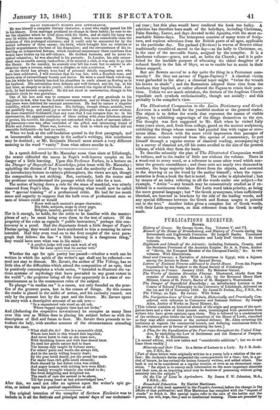Whether the age for epic poetry has passed—whether a work
can be written in which the spirit of the writer's age shall not be reflected—we
need not stay to discuss. Mr. Zavarr, the author of The Viking, has so
little idea of the difficulties which attend the composition of an epic, that he positively contemplates a whole series, " intended to illustrate the va- rious systems of mythology that have prevailed to any great extent in the world "; the projector being all the time apparently in a state of un- consciousness as to the commonest rules of the subject.
To plunge "in mediae res " is a canon, not only founded on the prac- tice of the greatest poets, but in the reason of things. By this means the reader is placed in the midst of action, and his curiosity roused, not only by the present but by the past and the future. Mr. Zavarr opens
his story with a descriptive account of an oak tree— "In a sequestered vale stood an old oak,
Whose rugged majesty time had not broke." And (deducting the respective invocations) he occupies as many lines over this tree as Milton does in placing his subject before us with the description of Hell and Satan to boot. Mr. Zavarr then proceeds to in- troduce the lady, with another account of the circumstances attending upon the case.
"What shall she do? She is a monarch's child, Whom love hath to this wizard dale beguiled; And never knew to wait as she must now, With throbbing bosom and with fear-dewed brow. No need her gentle nature had to learn The lessons only taught by fortune stern; For others' pains and wants she always felt, And to the needy willing bounty dealt: By the poor loved dearly, yet the proud her smile
Far easier than rich gifts could reconcile:
Rude discord by her dulcet voice was stilled,
And angry breasts with melting love were filled:
Her beauty wrought whate'er she wished to do; She lived delighting and delighted too. The reach of care she seemed to be above,
Till her young heart at last acknowledged love."
After this, we need not offer an opinion upon the writer's epic ge-
nius, or indeed upon his poetical capabilities at all.


























 Previous page
Previous page